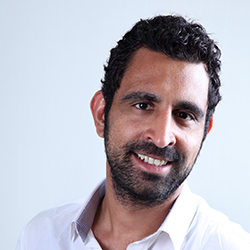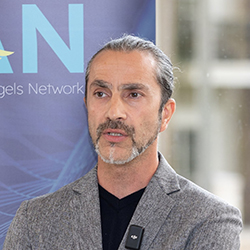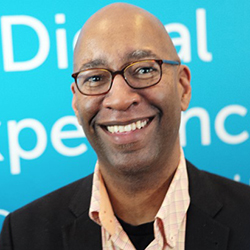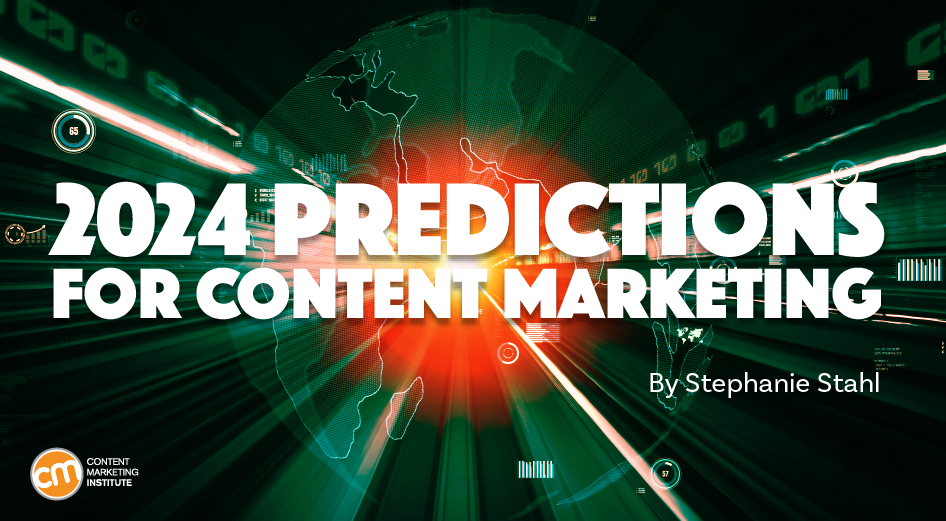“Should we even bother with the annual content and marketing predictions piece,” CMI wondered. “AI will just continue to dominate the conversation. Will there be any other visions for 2024?”
Wow, did this group of Content Marketing World speakers, Content Marketing Awards winners, and other community members surprise me.
Sure, you’ll see plenty of artificial intelligence mentions. But the references aren’t about things AI can or will do. They’re about how AI heightens the need for authentic connections and content marketing fundamentals, including less glamorous work like crafting goals, processes, and guidelines.
The predictions also address developments in the industry (like social media turmoil) and the world (international conflict, election cycles, mental health) that affect the work you do – and the people you do it with and for. You’ll also find a healthy dose of confidence and hope.
I’ll get things started with my content marketing forecast for 2024:
“With all the disruption in social media and the increased sensitivity around privacy, brands will work harder and smarter to build and nurture communities — not just to sell to but as a place to foster ideas, networking, and trust.”
Please share your reflections on these predictions (or your own) by email or on our social channels (tag @CMIContent). Oh, and if you’re looking for more 2024 insight, watch the videos. After all, multimedia is an important trend, too.
Table of contents
Trust and relationships take center stage
Content and marketing fundamentals have their moment
Turmoil changes the social media content game
Content makes the world a better place
AI moves to a supporting role
You read that right. AI won’t lead content and marketing. Our prognosticators see it in a mostly supportive role in 2024.
Hype gets real

2023 was all about AI hype. We all became budding prompt engineers and spent our time trying to figure out what AI tools we should be using.
2024 is going to be about the marketing methodologies that AI tools make possible. These are methodologies like real-time SEO content, 80/20 marketing, and call-transcript mining.
The way I like to think about it is that human marketers are going to do the thinking. They’ll do the creative thinking once and then use AI tools to expand that thinking across all the campaigns and channels they’re working on. – Dale Bertrand, president, Fire&Spark
This may hurt (for a while)

Everyone and their dog think they can use LLMs (large language models) to create content to drive their sales funnel and build their reputation. 2024 will be the year where we see what happens when they try. It’s going to be rough for a while as businesses cut down on hiring human writers or don’t hire them altogether.
But there will be light at the end of the tunnel when this strategy proves to be a race to the bottom for brands – and customers stop responding to content the way we’re used to. Maybe by the end of 2024, human creators will be even more valuable than ever as a backlash against bad content begins. – Ellen Lichtenstein, senior content specialist, AgentSync
Generative AI can’t handle content without help

In 2024, relying solely on AI for content won’t cut it. If brands want to connect, generate quality leads, and tell their story, AI can assist with 45 to 50% of the job, but human-written content will be essential for impact, connection, and conversion. – Prashant Puri, CEO, AdLift, Inc.
Marketers will welcome AI’s help

As content marketers better understand the virtues of artificial intelligence and its role in supporting their professional success, the marketing community will gradually view AI as a work assistant (shaving hours of minutia from their day-to-day workload) instead of a job assassin.
– Peter Loibl, head of sales, Content Marketing Institute
Prompts may make us better human communicators

I think we should prepare to discover how getting better at writing AI prompts helps us get better at communicating with humans. Think about it: You’re giving clear instructions and context, seeking confirmation, being specific, and asking open-ended questions.
Prepare by practicing. Practice making clear, purposeful requests. Practice communicating to be understood. Practice it with AI. Practice it with humans. And see your relationships with both improve. – Connie Smart, content specialist, Canadian Western Bank
AI finds a place outside of creation

AI isn’t just for creation and delivery. By using AI in the earliest stages of research and strategy, marketers can convert existing persona research into interactive AI simulations. Ask them anything, anytime.
AI personas can support detailed personalization and omnichannel strategies, which helps leverage infrastructure investments and accelerate content planning. – Noz Urbina, omnichannel strategist, Urbina Consulting
The age-old question of influencer value gets settled

A wise person said: To be a thought leader, you have to have a thought. For companies, this remains a challenge worth solving in 2024. For us practitioners, 2024 should bring next-generation solutions using AI. I’m jazzed about:
- The ability to value content and influencers using propensity modeling
- Using AI as a “muse” to scale intelligently.
– Avinash Kaushik, chief strategy officer, Croud Group
AI drives impact by saving time

Content marketers should be prepared to get more deeply aligned and connected with revenue teams and goals while adopting AI to increase efficiency, enhance personalization, increase and improve targeting, and get automated insights.
Marketing and sales alignment creates tangible benefits, including better retention, higher win rates, and increased revenue. Knowing what the business goals and processes are at each stage of the customer journey will power your ability to make your content drive even greater business outcomes.
Adopting AI will allow content leaders and teams to save time, scale, and focus on more strategic content priorities while driving maximum impact, which will be key to keeping up with the pace of business. – DeAnna Ransom, CEO, Red Monkey Consulting
Grab the AI helm (while you still can)

AI this, AI that, AI, AI (aye yai yai)! Marketers who fear AI’s rising influence should remember: You can’t stop the wheels of progress, but you can – and must – govern how they’ll turn. Set realistic guidelines around AI use in your content efforts and implement sound editorial practices to ensure any AI-enhanced output reflects the best of what your brand has to offer.
The time to act is now (before the robots get sophisticated enough to take the decision-making out of our human hands). – Jodi Harris, director of editorial content strategy, Content Marketing Institute
Get ready to justify your love – of AI and humans

The word on everybody’s lips is not Roxie … it’s AI. But I think with that comes understanding how to strategically build or evolve your tech stack, as every dollar will continue to be scrutinized.
Using AI thoughtfully to speed up proven processes (transcribing, ideation, repurposing pre-approved content) rather than relying on it as a fully functioning member of your team and being prepared to have conversations around the business case for resources. What do humans bring to the table that robots don’t? And why is it so critical to your business? Get these answers ready. – Chloe Thompson, former head of global content strategy and thought leadership, Reward Gateway
Take the lead on generative AI

Generative AI is something content marketers cannot afford to ignore in 2024. If your leadership isn’t providing strategic direction or training opportunities around generative AI in your organization, you have to do the work yourself. Get a group of marketers together and draft your company’s AI policies and ethical [guiding] star.
Set the pace and train yourself and your teams. Be the rising tide that lifts the AI literacy of your organization. Your leadership will thank you, trust me. – Jessica Hreha, founder of VMWare’s marketing AI council and head of global demand content strategy, VMware
AI gets smaller (but more relevant)

Content marketers will be introduced to AI tools that enable them to create small language models with the content they own, giving way to a customized ability to harness AI from their own data lake of content. – Bernie Borges, vice president of global content marketing, iQor
Take the garbage out first

2024 will be all about AI. To prepare, marketers need to make their content AI-ready by first curating the corpus and discarding old and incorrect information. Next, scrub the remaining content to train the AI. This entails fixing ambiguities, eliminating inconsistencies, and structuring the content for ingestion. – Val Swisher, CEO, Content Rules, Inc.
Pare down to make room for experimentation

I foresee a lot of experimenting with generative AI. We’ll learn where GenAI can help us and where it can’t. Curating our existing content is key to success, which means eliminating contradiction, redundancy, and inconsistency wherever we can. Pro tip: That makes our content better for humans, too. – Regina Lynn Preciado, senior director of content strategy solutions, Content Rules, Inc.
Deep breaks

2024 is going to be great. More people will be sharing humanizing content, supplemented with AI to make it more compelling … oh, wait. There’s a war in the Middle East, X (formerly Twitter) has all but gone to hell, and there’s a presidential election in the United States in 2024. The internet is going to be a shit show of deep fakes and propaganda. Good luck. – Ruth Carter, evil genius, Geek Law Firm
Trust and relationships take center stage
Many experts see a marked downstream effect from the AI hype – skepticism from audiences and a heightened need (and opportunity) to build trust-based relationships.
BS-meters rise, search traffic sinks

- We’ll see a continued rise in AI-created content, meaning more and more people will develop an “AI-BS meter” (as in, “No, I don’t believe this was written by a human.”) Many brands will create more content than they ever have and at the same time, many of these same brands will feel less human than they’ve ever felt.
- Short video will continue to explode. Ultimately, it will completely dominate all the major social media platforms. Because of this, it will become much harder to build a brand on long-form platforms like YouTube. At the same time, short-style video will be seen as a major initiative across the board, with B2B businesses everywhere attempting to jump into the mix.
- Search traffic will continue to go down because of ChatGPT. Many businesses will feel the pain of this dip and get much more serious about building brand equity on social media.
– Marcus Sheridan, speaker, author of They Ask You Answer, Marcus Sheridan International
Sincerity rises above the algorithms

There’s a trend even more prevalent than AI that’s been going on for so long that it’s barely being addressed in conversations: Audience fragmentation.
We are beholden to algorithms, digital noise, echo chambers, and low attention spans. In 2024, with more internet privacy laws coming due, worldwide conflicts, and a presidential election on the horizon, you can bet that people will be hunkered down in their algorithm-powered internet echo chamber of choice, and it will be even harder to cut through the noise.
There are two things that I think will help marketers prepare for this and weather the storm:
- Be radically transparent. Honesty and sincerity will always win out over artifice. Don’t look down on your audience or pretend things are A-OK everywhere. If things are hard, it’s OK to address that. Your audience will thank you and will find it refreshing. One caveat, though: Don’t wade into political discourse. That’s always a lose-lose, no matter where you stand.
- Once your content is sincere, it’s time to work hard to gain ownership of your audience. Despite several obituaries, email is still alive and kicking, and it’s the best way to communicate with people who are interested in your brand. Newsletter open rates are still high, and if you deliver value consistently in their inbox, you’ll gain trust and business. It’s OK to ask people to opt in. If you give them value and sincerity, I promise you they will.
– Inbar Yagur, co-founder and CEO, Radical B2B
The secret sauce is people

If there’s one prediction I will hang my hat on, it’s this: The heart and soul of content marketing remains people. Sure, generative AI tools like ChatGPT have transformed the content landscape, giving us AI-powered narratives at the tap of a button.
But – and it’s a big but – nothing replaces the raw, authentic emotion of human-generated content. The real secret sauce in the coming year? It will blend human touchpoints seasoned with AI-powered strategies for ideation, distribution, repurposing, and more.
Don’t think AI can do it all. Use it and benefit from it, but keep your content genuine and grounded. Being future-ready means recognizing that your audience craves relatable, human connections. Pair that with AI’s efficiencies and abilities, and you’ve got a winning strategy. – Cathy McPhillips, chief growth officer, Marketing AI Institute
Pendulum swings back

With the rise of widely accessible generative AI, I expect (and hope) we’ll see the pendulum swing back toward valuing more deeply human content: Content informed by lived experience, containing uniquely human stories using relatable and distinctive voices that can’t be as easily faked. – Melanie Deziel, co-founder, CreatorKitchen.com
Authentic voices resonate

In 2024, as AI-generated content proliferates, the demand and value for conversational content will surge. Consumers will increasingly gravitate toward genuine, human-like interactions over AI-crafted narratives as they seek authenticity and thought leadership. Marketers must amplify the importance of real conversations in their content strategy. – A. Lee Judge, co-founder/CMO, Content Monsta
Successful marketers buck the AI trend

In 2024, content marketers should focus on human storytelling, thought leadership, and ROI to combat the flood of AI-driven sameness.
Authentic narratives, sharing industry expertise, and demonstrating ROI will be key. Content amplification will also take on a bigger role in content plans in 2024. – Michael Brenner, founder, Marketing Insider Group
Storytelling still works

As AI and machine learning technologies continue to shape the content marketing landscape, personalization will be more crucial than ever. In the age of mass content generation, it’s easy to forget that people crave human connection and personalized experiences.
Storytelling provides a powerful way to connect with audiences on a personal level. By gathering and analyzing data on their audience, marketers can tailor their content to create more engaging and custom experiences. – Brittani Sievers, content management specialist, Southland Industries
Ideas differentiate

We’re on the cusp of a generative AI content boom, and much of that content will likely be derivative by virtue of how generative AI sources its input. As such, original, creative thinking will become even more important for content creators to ensure their content and ideas stand out from that which is informed by what already exists.
Thought leadership will become a critical differentiator for brands to ensure their content stands out and articulates something new that doesn’t already exist in the market today. – Dusty DiMercurio, senior director, industry and portfolio marketing, Autodesk
Research helps, too

Original research can keep you a step ahead. AI will play a growing role, but it’s only as good as the information available to it. It’s more important than ever to focus on developing content rooted in original research that your audience can’t find anywhere else. – Hayden Goethe, senior content marketing strategist, WEX
Marketing gets personal

As AI starts to become more ingrained in the content marketer’s daily process, voice and authenticity will become increasingly important. Many marketers have built their communities on trust, and with the growing wave of AI, it will be paramount to maintain that trust. This will lead to an uptick in personal engagement over the next year. – Joseph “JK” Kalinowski, creative director, Content Marketing Institute
Content gets hyper-personal

No change here: Short articles and videos will continue to reign supreme as the most popular content formats. Personalization and hyper-segmentation are becoming increasingly important. Interactivity is another big trend. Omnichannel marketing is still a big thing.
Some changes for 2024: AI-assisted content creation tools will still be mediocre for most, and teams will struggle to find use cases that promote the adoption of these tools at scale. Authentically human content (live video, podcasts, events) will be in higher demand as the trust erodes from synthetic content.
The scalable automation of hyper-personalized content will emerge, driving more demand for this type of creation and consumption model. – Yadin Porter de León, global executive content marketing lead, VMware
Personalization takes investment

In 2024, personalization will be key in content marketing. Content marketers should invest in AI, marketing automation, and business intelligence to understand audience needs and share hyper-relevant content. This, alongside focused audience building on “owned land,” enriches user experiences and positions the brand as a trusted, valuable source. – Michiel Schoonhoven, managing partner, NXTLI
Relationships generate demand

Content is marketing, just not how most of us define it. In B2B especially, content is a vehicle for ideas, value, expertise, and influence. However, it’s at its most powerful, not as an end in itself — to drive traffic or leads — but rather as a means (a substantive excuse) to build relationships. Content must be accompanied by a distribution strategy at the individual level. This elevates the need for quality production as well as the need for reimagining the role of content in demand generation. – Aaron Orendorff, head of marketing, Recart
Trust trumps tech

Every B2B tech company has been chasing the clicks of performance marketing since the web went mainstream about 20 years ago. They’ve increasingly done so at the expense of investment in any aspect of marketing that’s hard to measure – like brand.
It’s not working anymore because more tech companies are chasing fewer in-market buyers. Consequently, savvy content marketers in B2B will rethink their approach in 2024 in three ways:
- They will focus on building trust, credibility, and relationships by developing educational content that builds opt-in email subscribers to their content marketing programs.
- They will favor high-quality content production that’s made for humans and by humans over content produced by generative AI. Generative AI slides down into the proverbial “trough of disillusionment” as content marketers in B2B will come to grips with the fact its regurgitated content merely adds to the “sea of sameness.”
- They will break open the gates and remove the friction of registration pages – making it easy for customers and prospects to consume and share content.
– Frank Strong, founder and president, Sword and the Script Media, LLC
So, get the facts right

Journalistic integrity will reclaim its rightful place atop the heap of commodity content that is already piling up due to AI misuse. Gen Z is savvy — they can tell when creators cut corners. As content marketers, it is our honor and responsibility to balance storytelling with facts, telling the true story without the cliche spin.
Your audience and search engines want unique content that provides insight and solutions. Can you achieve that with AI assistance? Of course. But you should always, always be fact-checking, revising, and checking again.
Don’t waste your audience’s time with half-baked, copied content. They come to you for your answers, not dime-a-dozen paragraphs. – Mariah Obiedzinski, assistant vice president of content marketing, Stamats
Reality rules

Now is the time for actual authenticity. It’s all about being transparent, relatable, and, dare I say, human. There is virtually no difference between who your brand is and how you show up to your audience. Audiences are craving genuine stories, not just content.
As for steps:
1. Deep dive into understanding your audience like never before. Use data, sure, but also talk to them and engage in real conversations.
2. Hone your brand voice. If you’re not sounding like a person your audience would grab coffee with, it’s time for a rethink.
In 2024 and beyond, embrace change, stay curious, and keep it real. – Ahava Leibtag, president, Aha Media Group
Influencers and private communities stand out

B2B content marketers should brace for a surge in AI-generated content, continued emphasis on influencer marketing, and an increasing interest in private communities.
To stand out, content marketers must prioritize creating unique content, collaborating with influencers, understanding the importance of private communities, and determining whether they should launch one for their company. – Justin Levy, senior director of influencer marketing and head of community, Demandbase
People still want to connect with other people

Prepare to see a drop in organic traffic and an increase in the desire for community, storytelling, and human connections.
Leverage AI tools to repurpose and reimagine your content so you can distribute to more channels and reach your target audience.
Do keyword research to discover what questions and problems your users have. – Brian Piper, director of content strategy and assessment, University of Rochester
Trust wins

Expect ad inventory to be eaten alive in the United States by the election. Expect trust in all content to decline as AI is horrendously abused by malicious parties as part of the election cycle. Trust will be the scarcest commodity for marketers in the year ahead. – Christopher Penn, chief data scientist, Trust Insights
Content and marketing fundamentals have their moment
I won’t say these commenters advocate for a back-to-basics approach because some basics have shifted and expanded. But they see a renewed attention to and value in knuckling down to do the hard work.
Hold the (strategy) line

Same as always! Know your audience. Set your objectives. Create useful and differentiated content. Measure, test, measure. OK, and maybe fool around with AI a little. But mostly, keep to a consistent strategy and avoid shiny objects. You can’t go wrong. – Ali Orlando Wert, senior director, content strategy, Appfire
Get organized from the start

Most will say AI, but the broad adoption of AI and the growing need for content across channels is creating stress on how teams create, manage, and distribute content. For years, marketers have embraced a “we’ll-make-it-work” attitude.
But we’re hitting an inflection point of speed and (content) need that is truly requiring marketers to invest in tools to organize content at the beginning of the content lifecycle. Start looking at tools now and thinking about ways to break down silos that exist between content-distributing channels. – Jill Roberson, vice president of digital marketing, Velir
Get your messaging straight

2024 will be the year marketing leaders recognize the importance of a consistent, well-researched, and customer-focused messaging source document. Humans and AI tools need a starting point to effectively create content and campaigns.
Outsource it, set up a tiger team, or however you create it, make sure you have agreed and approved messaging. – Penny Gralewski, vice president of marketing, STORIES of Space
Map the journey

Content and commerce were converging rapidly in 2023, with shoppable posts and interactive shopping experiences becoming more prevalent on social media and e-commerce platforms.
Preparing involves mapping out the customer journey to identify touchpoints for content, encouraging customers to leave reviews, ratings, and testimonials, incorporating shoppable posts, addressing common questions and concerns through content, and creating content that targets long-tail keywords and addressing customer queries. – Christine Michel Carter, director, content marketing strategy, Lexia
Sales collaboration makes an impact

Many marketing organizations downsized budgets and workforce in anticipation of an economic slowdown in 2023. As we approach 2024, organizations are poised for a marketing “reboot.” This renewal will take various forms.
Some will try to do more by leveraging AI and martech integration. Some may reassess their approaches to fine-tune marketing outreach. Yet, the common thread among them is the critical need to measure the impact of marketing in the context of sales.
Marketers need to work closely with sales and demonstrate marketing ROI via revenue impact. It’s inevitable. – Pam Didner, B2B marketer, speaker, author, and podcaster, Relentless Pursuit
But everything will be harder to measure

2024 will be a tough year for data-driven decisions. As click-through rates go down, attribution gets harder. The use of cookies is getting harder. And Google Analytics 4 isn’t making life easier.
Smart marketers will continue to drive results. Many will continue to embrace weak-attribution channels like social, YouTube, word of mouth, and podcasting. But we’re all going to feel like we’re flying blind a bit more than usual in the new year. – Andy Crestodina, co-founder and CMO, Orbit Media Studios
Explore the science

Marketers must prepare for the AI-generated content onslaught and the subsequent need for content to be more human.
We must embrace the messy ways people decide what to read and when to buy – with their biases, heuristics, and hardwired responses – and create brain-friendly, behavioral science-infused messaging that innately appeals to people, increasing their likelihood to notice and respond. – Nancy Harhut, chief creative officer, author of Using Behavioral Science in Marketing, HBT Marketing
Not surprisingly, delight will still win

Familiar surprises will earn the attention of your audience. In the content-dense environment of 2024, the challenge is for brands to stand out in a likable way. Content marketers who find the threshold for delivering creative work that delights audiences at the edge of their comfort zone will win. – Amanda Driscoll, senior content director, Adams & Knight, Inc.
Get ready to work hard for results

In 2024, professional marketers will have to be the grown-ups in the room. This will be hard because the children will make lots of ruckus about AI, digital transformation, and other broad, impossible-to-pin-down abstractions that dominate conversations without contributing any actual meaning or value. You’ll have to find a polite way of saying, “Earth to client, reality check.”
Illusion: Contemporary technology has found an easy way to achieve your goals on the cheap. Reality: Everyone has access to the same “cheap-and-easy” tools you have.
Unless you’re prepared to apply critical thinking and lots of elbow grease to your challenges, you’re going to get the same mediocre, lackluster results as your competition. Yep, expertise and experience are expensive – but lack of the same will cost you sooooo much more. – Jonathan Kranz, principal, Kranz Communications
Process heats up

In 2024, content marketers should prepare for generative AI to move beyond novelty and hype and become a normal part of our day-to-day workflow.
The implications go far beyond mastery of the perfect prompt: To make the most of the upside potential while mitigating risks, we’ll need to pay just as much – or even more – attention to the unsexy bits like process, policies, and governance. All that time you manage to save with AI can then be reallocated to improve your content structure, metadata, file naming conventions, brand guidelines, and the like. – Carmen Hill, content strategist and writer, Chill Content, LLC
Get proactive

Content. Supply. Chain. These three little words will transform (in a good way) how well content is generated and performs. Proactively managing the content process from ideation to archive will invigorate and positively enable content and content marketing programs for any size organization. – Cathy McKnight, chief problem solver, TCA
Prepare for continued change

Change! There’s no shortage of innovation on the horizon, and your skills in facilitating change could make or break how you feel this time next year.
Figure out how to benchmark team capacity and change fatigue so you can push back on shiny object syndrome. Make sure you have documented commitment from leadership before you spend your valuable time scoping a problem they may not be ready to resource. It’s going to be an amazing year if you’re ready to build better buy-in and lead innovation. – Jenny Magic, founder, Build Better Change
Just go with it

Content marketers should prepare for change in 2024, which will require open-mindedness and adaptability. Technology will displace prior responsibilities, so be proactive in exploring new areas. Have a mindset that change is a constant – the status quo is gone forever. Get ahead of the curve and be the change. This might involve taking on new roles within marketing, going out on your own, or (gasp) leaving marketing entirely. – Dennis Shiao, founder, Attention Retention LLC
Content teams take priority

In 2024, companies will get more serious about creating content teams with specifically skilled members. Possibly even taking resources away from traditional marketing teams because they are starting to see the importance of an end-to-end content function. – Andi Robinson, content consultant, Hijinx Marketing
Time to learn to market

Honestly, most of us are content creators first and marketers second (or third or fourth). The two words — “content” and “marketing” — are like two legs: If you don’t stand firmly on both, you risk falling over.
In 2024, we should prioritize marketing knowledge and efforts, even if it means reducing content efforts. – Bert van Loon, strategist, CMFF
Get ready to specialize …

We are all in on being specialists. It’s an ongoing trend that’s only going to continue in 2024. It could be by industry, but that’s just the beginning. Someone might be a TikTok specialist, an email specialist, a conversion specialist, etc. We’re going to see fewer one-stop shops. – Tony Gnau, founder and chief storytelling officer, T60 Health
… And do it all exceptionally well

Prepare to be the most innovative and creative human you’ve ever been.
Prepare for the most skeptical, discerning, and least patient consumers of your content (we lovingly call them target audiences) you’ve ever had to engage.
Prepare to obsess about your audience like you’ve never had to before.
Prepare to make unexpected things, launch them in unusual channels, and make them matter in unthinkable ways.
Prepare to compete for attention with human creators and to compete for scale with robots. Spoiler alert: You can’t compete with robots.
So what I’m saying is, prepare to be awesome. That’s what it’ll take in 2024. – Mark Kats, senior vice president of agency growth, Manifest
Perfected pitches wring more from existing content

More companies will see the value in repurposing their owned media (= content) as earned media (= PR). Often, content sits collecting dust on their sites. But by using a PR approach, they can get it in front of more potential customers.
Of course, the content that makes the best fit for this type of approach isn’t AI-generated soundalike content but unique content that features original research, customer success stories and case studies, and true thought leadership. Strong visuals can also help your content to stand out when you pitch it to editors, so don’t overlook the importance of capturing compelling photos and video. – Michelle Garrett, PR consultant and writer, Garrett Public Relations
Up with people

Next year is going to be the year of the personal brand. Companies are going to be leaning more and more into individual thought leaders with a strong personal brand as the differentiator that makes their content unique.
With everybody using AI and having access to this tool that makes developing content easier, it’s going to be the ones that stand out who actually get the attention, even when it comes to Google’s algorithms. – Ryan Brock, chief solution officer, DemandJump
Invest in applied learning

Set aside two hours a week to learn about AI – newsletters, webinars, following industry leaders on LinkedIn – and three hours a week to apply new tools to your job.
Sharpen up your critical thinking and creativity skills. My best advice? Ask Chat GPT. – Jim Sterne, president, Target Marketing of Santa Barbara
Focus on people-powered curation (and enable bingeing)

- Generative AI will accelerate the commodification of taste. For all the personalization and ease AI promises, opaque algorithms and a deluge of content will also make organic discovery more difficult. With unique, human recommendations at a premium, marketers will need to become curators as well as creators.
- In 2023, streaming eclipsed cable. In 2024, social will come for streaming. Users on TikTok, reels, and shorts already prefer binging content over socializing, and as their consumption continues to soar, social-savvy marketers can achieve the reach and impact of traditional TV spots on significantly smaller media and production budgets.
– Molly Jones, associate director, brand strategy, Sparkloft Media
Prepare for video dominance

Content marketers must prepare for a seismic shift towards video-centric SEO, necessitating the mastery of visual storytelling and metadata optimization to ensure discoverability within search engine algorithms. Your website will be 70% short-form videos — get ready now. – Vahag Karayan, co-founder and CEO, BrandLens
Audio rises to boost inclusivity and utility

In 2024, adding audio to sites will be a crucial strategy for brands looking to stay relevant and engage with their audience effectively. With the continuous rise in voice-activated devices and smart speakers, audio content will become integral to how people consume information.
By incorporating audio, you’re making your content more convenient and accessible to a broader audience, including those with visual impairments. You’re also making it easier for readers to consume your content on the go, whether commuting to work, cooking, or working out. It’s a win-win situation: Your brand becomes more inclusive, strengthening its online presence, and your audience gains the freedom to access your content in a way that suits their lifestyle. – Lisa Dougherty, senior manager, blog operations and community, Content Marketing Institute
Interactivity leads to engagement

By 2024, interactive content like quizzes and polls will be critical for content marketers. To achieve their marketing goals, content marketers must create interactive content relevant to their target audience. Use available tools and platforms to create relevant and engaging content that helps achieve your marketing goals. – Lomit Patel, chief growth officer, Tynker
Don’t forget about Web3 …

Web3 deployment will accelerate in 2024 because it promotes decentralization and individual user empowerment, reducing reliance on YouTube, X, TikTok, Netflix, and other third-party content platforms. Content creators will have more control over their data, narrative, and distribution.
Marketers should educate themselves on cryptocurrencies, which will serve as the payment system on Web3 and enable peer-to-peer transactions for content. Non-fungible tokens (NFTs) also will allow creators to own and trade unique digital assets, making Web3 very decentralized and democratized. – Darren Bosik, senior director of data science, APCO Worldwide LLC
… Or publishing 1.0 (aka print)

Everyone is throwing themselves at digital and, at the same time, has forgotten the huge opportunity in print. The web is where we go to get answers, but print is where we go to ask questions.
The print vehicle is still the best medium on the planet for thinking outside the box and asking yourself tough questions based on what you read – it’s lean back versus lean forward. It gives permission to unplug.
Brands that deliver a valuable, compelling, and consistent print magazine to their audiences have a tremendous advantage over the competition. Why? Because there is no competition. Plus, 100 percent deliverability.
I’ve been in the print publishing business for over 20 years, and I’ve never seen an opportunity like this. – Joe Pulizzi, founder, Content Marketing Institute
Social media turmoil changes the content game
Changes in the social media landscape will affect content and marketing in strategy, budgets, traffic, and more, according to these experts.
Measuring social media influence gets harder and costlier

When I speak with clients relying on social media in their marketing strategy, I stress the importance of reviewing the influence of their social media platform choices on their referral traffic and conversions.
2023 was particularly volatile, with not only Twitter changing to X and the ascendency of a variety of new choices (led by Threads) but also the rising cost of social media dashboards. Hootsuite eliminated the free version of its dashboard, while TweetDeck has been folded into services X is looking to offer users at a subscription price.
All of this means marketers must dig deeper into identifying the ROI from social media platforms – a task that is also harder now from an analytics perspective. – Pierre DeBois, founder and CEO, Zimana Analytics
Think beyond the link

As social platforms continue to favor linkless content and Google continues to optimize search results for answer delivery, marketers need to pivot their objectives for these platforms from driving direct traffic to a more customer-centric intent of delivering immediate value. – Patty Radford Henderson, founder and CEO, Annum
Social challenges search, and Gen Z challenges everything

As more searches move to platforms like TikTok, organic search will collide with social media in ways it hasn’t in the past.
And Gen Z will age into the marketplace. They have different expectations for how privacy, technology, and causes intersect with brand experiences. Working to balance how to engage with this generation while continuing to drive value for older generations is going to create some interesting problems, especially consumer goods brands.
It’s going to be more important than ever to understand target consumers and personalize their experiences without straying too far from your core brand. I think 2024 is going to be a year of accelerated learning in this space.
Lastly, social media is also evolving rapidly. By the end of 2024, we may see new platforms emerge quickly with more users than formerly tried-and-true platforms. New power plays will emerge. It might be Threads, Blue Sky, or something that we haven’t seen yet, but there’s going to be a realignment in this space. – Tiffany Grinstead, vice president, personal lines marketing, Nationwide
More media, but less social

We will experience a social media marketing collapse. Social media just becomes media. X (aka Twitter) dies or becomes a zombie. And the remaining bigger platforms (Facebook, Instagram, Threads) become media distribution networks like YouTube and TikTok. LinkedIn is the only one remaining, but it will become more of a business content syndication network and less of a social network. – Robert Rose, chief strategy officer, TCA, chief strategy advisor, Content Marketing Institute
It’s TikTok’s time

TikTok becomes the No. 1 search engine for content marketers. Data-driven content marketing on TikTok will become mainstream in three steps:
- Research keywords on TikTok.
- Validate ideation by viewing viral videos.
- Mutate (craft) the message with your brand voice and unique story.
– Joanne Sweeney, chief executive officer, Public Sector Marketing Institute
Content helps make the world a better place (we hope)
Everybody wants a brighter future. And some see content playing a role in improving things at a macro or micro level.
Values and authentic participation in causes matter

As we enter 2024, it’s very clear that sustainability and ethics are vital in content marketing. Today’s consumers care a lot about supporting brands that truly live their values. So, businesses need to include eco-friendly and ethical stories in their content.
This could mean storytelling, being open, and talking honestly about the company’s sustainability journey. It’s also about educating your audience, partnering with like-minded organizations, and showing off your eco-friendly products. Don’t forget to lead conversations about sustainability and ethics in your industry, too. And most importantly, get your community of sustainability-focused customers involved.
Think about how you can make creating content more sustainable. Finally, share your progress and impact with your readers and viewers. In short, 2024 is all about using your content to make the world better. – Funbi Afolabi, PR and marketing senior account manager, Transform Communications
Humor and humility connect people – and lead to hope

Last year, my daughter started having panic attacks. And I felt completely helpless as a father until we finally got help. She’s doing great now, and she’s allowed me to tell her story because she knows other people are struggling with this. Any time we can create something that helps other people see that they’re not alone, it’s a wonderful thing. It’s a great way to connect and earn trust.
And when we can use humor and humility to share our wounds and our brokenness with people, not in a profound way, necessarily, but just talking about how we overcame a struggle at work or having a customer share a story about getting through a dark time during COVID and how they came out on the other side. People love a redemption story because it gives us all hope. – Tim Washer, chief creative officer, Ridiculous Media
Cover image by Joseph Kalinowski/Content Marketing Institute

